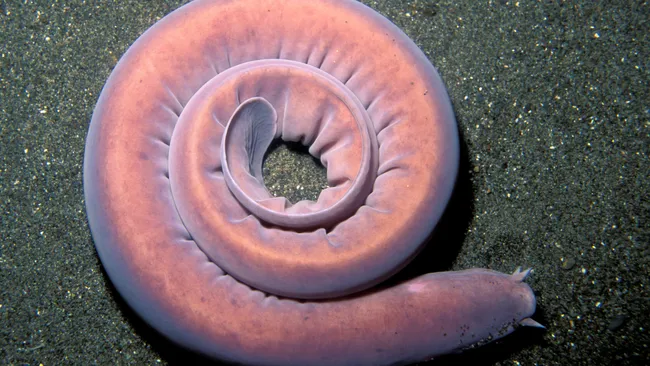Meet the Pacific hagfish (Eptatretus stoutii), a peculiar eel-like creature that calls the cold seabeds below 300 feet (90 meters) home. This fascinating fish thrives in the depths, where it feasts on small invertebrates and the carcasses of deceased animals that descend to the seafloor.
What makes the Pacific hagfish truly remarkable is its defense mechanism—a suffocating slime that can incapacitate even the fiercest predators. These ancient fish, existing for over 500 million years, resemble giant earthworms, lacking fins or scales. With rows of formidable teeth protruding from their jawless mouths, they strike an eerie sight. Despite their eel-like appearance, hagfish belong to a unique category of fish known as cyclostomes, bearing a skull but lacking a jaw.
When threatened, hagfish unleash their extraordinary slime, capable of thwarting attackers, including sharks. Each hagfish possesses specialized glands containing slime threads, storing an impressive amount within their skin. This defensive strategy is so effective that there are no recorded instances of successful predation on hagfish by gill-breathing predators.
This slime’s potency was vividly demonstrated in a 2017 incident when a truck transporting hagfish overturned on an Oregon highway, dousing the roadway in a sticky coating. Beyond defense, hagfish play a vital ecological role as scavengers, consuming decaying tissue and aiding in nutrient cycling within deep-sea ecosystems.
Despite their menacing appearance, hagfish are infrequent feeders, gorging themselves only every few months. With poor vision, they rely on their acute sense of smell to locate prey, assisted by tentacles around their mouths and specialized projections on their rasping tongues.
In the mysterious depths of the ocean, the Pacific hagfish stands as a testament to nature’s resilience and ingenuity, showcasing extraordinary adaptations for survival in the depths of the abyss.
